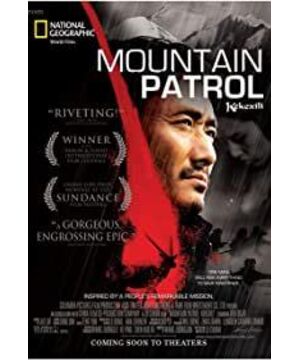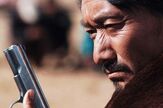Hope in exchange for blood---A brief analysis of the binary opposition in the film "Kekexili"
Andre Bazin said: "The film is the asymptote of reality." Everything that happens in the film has been staged in reality. In Hoh Xil, poachers are very rampant, breaking the beauty and tranquility of the place. A reporter from Beijing risked his life to follow the patrol team into the hinterland of Hoh Xil, recorded the poachers' numerous crimes and made them public, and promoted the natural protection of Hoh Xil. establishment of the district. This "Kekexili" directed by Lu Chuan is not only an environmental protection film adapted from a real event, but the numerous binary oppositions in the film are also worthy of discussion and aftertaste by the audience.
The opposition of life and death. Hoh Xil is a very quiet place, as if time stood still at this moment, so the director focused the film's focus on a single individual, a flesh-and-blood human being. In essence, the shots of this film are calm and objective, and can even be called indifference, silently recording the deaths of one person after another, no matter whether it is a poacher or a mountain ranger, it is the objective record this time and again that makes the film unsettling. On a layer of tragedy and a sense of heaviness. Team member Liu Dong was unfortunately engulfed by quicksand while transporting supplies. The director filmed the entire process of his death, first swallowing Liu Dong's legs, then his waist, then his shoulders, and finally he disappeared into this "Desert Killer". At this time, the picture is very quiet, and the boosting effect of sound and color on the picture is minimized. The audience can only hear Liu Dong's hand scratching the sand and the whimpering of his throat. It is in this extremely quiet environment that life passes by. The visual and audible shaping makes the audience truly feel that the fresh life is so small in the face of nature and death. We can take the reporter's perspective as the audience's perspective. The director's intention is to make the audience as part of the mountain patrol team to perceive the greatness and focus of life by exploring the truth of poaching step by step and experiencing the difficulties of chasing poachers. The fear of death, experience the quietness of only you in the world. Just as the team members hug each other and say their blessings to each other every time they separate, every separation may be a farewell between comrades in arms. The director constantly explores the relationship between life and death through sky burial and recording death. Ritai and other mountain patrol members defended the land they love in Hoh Xil at the cost of their lives. The sacred way was integrated into nature, returned to the true nature, and finally was forever together with the beautiful and peaceful Hoh Xil. This is a rare warmth in the objective picture of the film, but this warmth is obviously based on the heartfelt tragedy. of.
The opposition between law and love. The mountain patrol team members are the guardians of Hoh Xil. At the same time, they also sell Tibetan antelope skins to solve the survival dilemma when they encounter a shortage of funds. It is difficult to say which of the two is right or wrong, because only when the team members survive, the Tibetan antelope here can be killed. The possibility of protection, so there is the opposition between hero and anti-hero in the conflict of love and law. Heroes get scared when they meet a blizzard, cry when they separate, kiss each other when they say goodbye to their families, and of course they die. Such an anti-hero setting is reminiscent of "No Country for Old Men", a similar anti-hero setting makes the two Movies are meant to strip themselves out of drama. It is the flesh and blood that make this film more real and closer to the style of a documentary. Here, it is very clever to avoid arranging this film as a simple plot type film. Like the height of the prize. The team members shot and caused a poacher's femoral artery to be pierced and bleed to death during law enforcement. The method is cruel, but it is also necessary in Hoh Xil, a land forgotten by law. As the lines say, "Those who kowtow have their hands and faces very dirty, but their hearts are very clean." This is the opposition between means and purpose, or the opposition between process and original intention. Whether the legal purpose can be achieved through illegal means, the director did not give a clear answer to this question, but it is worth exploring for every audience. The film is based on this question as a clue to advance the plot. Perhaps in the first half of the film, the audience had different attitudes towards the practices of Ritai and others, but when the audience followed the mountain rangers to witness the skinned Tibetan antelope carcasses, their opinions converged. The footage and soundtrack of this section are very powerful, impacting the heart, and the advantages of shoulder-shoulder shooting are outstanding. With the resolute profile of the mountain patrol team members, the audience can understand the director's attitude towards the team members using illegal methods. Such a method In Lu Chuan's "Nanjing! Nanjing! " is also used a lot. The loyal bones are buried everywhere in Qingshan, and the body of the horse leather is returned. It is obvious that the lens language of the film expresses that the actions of Ritai and others to defend the sacred land and their pure beliefs at the cost of their lives are great, heroic, and worthy of praise.
The opposition between man and environment. From the lines, we can know that "Kekexili" means "beautiful green mountains, beautiful girls" in Tibetan, but the truth is quite different from the name. The inaccessibility of people and the snow-covered mountains made it difficult for everyone who stepped into Hoh Xil to survive. There is such a line in the film, "Every footprint you step on may be the first footprint since the birth of human beings." Many scenes in the film reflect the few people in Hoh Xil and the insignificance of people in front of nature. In the group portraits, the director mostly abandoned the narrative scenes and adopted large scenes such as long-range and panoramic views. People and cars accounted for a small proportion of the picture and lived in the middle of the picture, except to show that there are only a few of them in the beautiful and dangerous places in Hoh Xil. , Some people are not worth mentioning in harsh environments, which sets off the greatness of the mountain rangers, as the film tells-they broke up with their girlfriends the moment they entered Hoh Xil, and they decided their fate and time. Bundled with Hoh Xil.
This film not only focuses on death, but also explores the eternal topic of life and death, which is the eternal topic of human beings, by showing the mountain rangers' reverence for Hoh Xil and their own pure beliefs, and also a call for the government to issue relevant policies. People often say that the film only exposes the problem but does nothing to solve it, but this film directly promotes the establishment of the Hoh Xil Nature Reserve. Through the means of light and shadow, the world pays attention to the place where the belief in Hoh Xil is often burned. After witnessing death, we get It is the hope of Tibetan antelope and the future of Hoh Xil.
View more about Mountain Patrol reviews










